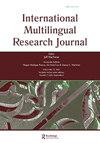Principled practice for drama and theater arts with multilingual learners
IF 2.1
1区 文学
Q2 EDUCATION & EDUCATIONAL RESEARCH
引用次数: 0
Abstract
ABSTRACT All disciplines have particular ways of knowing, common practices, and means of using language that mediate and potentially support engagement with the discipline. For multilingual learners, language demands of a discipline can be a closed door or a facilitated entryway. Drama and theater arts, the focus of our article, are often marginalized in curricula across the grades and therefore receive less attention to relevant disciplinary activities and language demands. In response to this pattern, our paper has several aims. We highlight ways language demands are embedded in drama and theater arts curricula and activities. Second, we describe and analyze ways instruction can attend to these demands and support multilingual learners’ engagements with them. Third, we distill a set of principles that can guide teachers, guest artists, and teacher educators in their work on drama and theater arts with multilingual student populations. To accomplish these aims, we draw upon our own and others’ teaching and research to frame instructional practices that support multilingual students’ engagements with drama and theater activities. Engagements we describe span early childhood through high school years. Tapping our own work in several US states (Illinois, North Carolina, California), as well as in Argentina and the UK, we present data and themes from a high school study featuring drama and theater arts practices used with multilingual learners. We examine how principles from our framework are illustrated in data of the study. We also identify challenges and critical adaptations that may be needed to realize the potential of drama in work with multilingual students. Principles we identify may aid teachers, guest artists, and teacher educators in shaping drama and theater arts activities that spotlight language demands of the discipline(s) of drama and theater and provide supportive and meaningful instruction.与多语言学习者一起进行戏剧和戏剧艺术的原则性实践
摘要所有学科都有特定的认识方式、共同的实践和使用语言的方法,这些语言可以调解并可能支持学科的参与。对于多语言学习者来说,一门学科的语言需求可以是一扇紧闭的门,也可以是一条方便的入口。戏剧和戏剧艺术是我们文章的重点,在各个年级的课程中往往被边缘化,因此对相关学科活动和语言需求的关注较少。针对这种模式,我们的论文有几个目的。我们强调了语言需求在戏剧和戏剧艺术课程和活动中的嵌入方式。其次,我们描述和分析了教学如何满足这些需求,并支持多语言学习者参与其中。第三,我们提炼出一套原则,可以指导教师、客座艺术家和教师教育工作者在多语言学生群体中从事戏剧和戏剧艺术工作。为了实现这些目标,我们利用自己和他人的教学和研究来制定教学实践,支持多语言学生参与戏剧和戏剧活动。我们所描述的交往经历从童年到高中。利用我们在美国几个州(伊利诺伊州、北卡罗来纳州、加利福尼亚州)以及阿根廷和英国的工作,我们展示了一项高中研究的数据和主题,该研究以多语言学习者使用的戏剧和戏剧艺术实践为特色。我们研究了我们的框架中的原则是如何在研究数据中得到说明的。我们还确定了可能需要的挑战和关键改编,以实现戏剧在与多语言学生合作中的潜力。我们确定的原则可以帮助教师、客座艺术家和教师教育工作者塑造戏剧和戏剧艺术活动,突出戏剧和戏剧学科的语言需求,并提供支持性和有意义的指导。
本文章由计算机程序翻译,如有差异,请以英文原文为准。
求助全文
约1分钟内获得全文
求助全文
来源期刊
CiteScore
4.10
自引率
4.80%
发文量
19
期刊介绍:
The International Multilingual Research Journal (IMRJ) invites scholarly contributions with strong interdisciplinary perspectives to understand and promote bi/multilingualism, bi/multi-literacy, and linguistic democracy. The journal’s focus is on these topics as related to languages other than English as well as dialectal variations of English. It has three thematic emphases: the intersection of language and culture, the dialectics of the local and global, and comparative models within and across contexts. IMRJ is committed to promoting equity, access, and social justice in education, and to offering accessible research and policy analyses to better inform scholars, educators, students, and policy makers. IMRJ is particularly interested in scholarship grounded in interdisciplinary frameworks that offer insights from linguistics, applied linguistics, education, globalization and immigration studies, cultural psychology, linguistic and psychological anthropology, sociolinguistics, literacy studies, post-colonial studies, critical race theory, and critical theory and pedagogy. It seeks theoretical and empirical scholarship with implications for research, policy, and practice. Submissions of research articles based on quantitative, qualitative, and mixed methods are encouraged. The journal includes book reviews and two occasional sections: Perspectives and Research Notes. Perspectives allows for informed debate and exchanges on current issues and hot topics related to bi/multilingualism, bi/multi-literacy, and linguistic democracy from research, practice, and policy perspectives. Research Notes are shorter submissions that provide updates on major research projects and trends in the field.

 求助内容:
求助内容: 应助结果提醒方式:
应助结果提醒方式:


